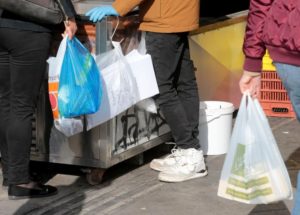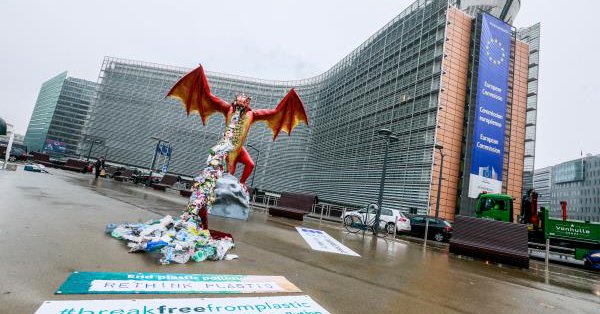No thorough discussion has taken place on the bill on plastic bags, which provides for a charge of 5 cents beginning of July 2018, and which the government had tabled at the eleventh hour and the House of Representatives rushed to pass it, Cyprus Greens Parliamentarian Charalambos Theopemptou has told the Cyprus News Agency.
Cyprus will be introducing the charge of 5 cents this coming summer, following a number of countries in the EU which have already taken strict measures in order to reduce the usage of plastic bags or have banned them completely.
This comes as no surprise if one takes into consideration the huge problem the environment faces with plastics. Only recently the European Commission has adopted the first-ever Europe-wide strategy on plastics which is part of the transition towards a more circular economy.
Under the new strategy, the European Union will make recycling profitable for business, will curb plastic waste, stop littering at sea and take measures to drive investment and innovation.
MP Theopemptou is one of few who have been warning about the consequences of plastic waste and has been criticising the public services for their failure to manage the plastic and other waste in Cyprus.
We met Theopemptou, the former Commissioner for the Environment, and asked him about the situation and whether the new bill is an adequate measure, taking into consideration the somewhat negative feedback because the supermarkets will benefit from the charge on plastic bags.
Theopemptou explained that the cost of production of plastics is extremely low, plastic is very easy to use and very accessible. He said that the public has not comprehended that this massive use of plastic is connected with health problems, environmental destruction and much more.
“We have been, for many years, aware of all these problems, but unfortunately we have not done anything at all to try to reverse the situation. Other countries have long ago introduced measures to reduce the use of plastic bags, Ireland for example has been charging for plastic bags since 2002, many African countries and some Latin American countries have banned plastic bags. Even China from which we import plastic bags has since 2008 completely banned plastic bags. However, besides the plastic bags, we use other plastic materials in our everyday lives, such as plastic bottles, caps and even laundry and washing powders. Microrobeads are used in cosmetics and toothpastes, and even plastic rice is added to the normal one,’’ he says.
Asked in particular about the situation in the Mediterranean, where the use of plastics is enormous, the unruly construction has destroyed the environment and the maritime, and the climate change is also responsible for the large migratory and refugee flows, Theopemptou says that the problem lies with the fact that the Mediterranean countries are not very eager in cooperating with each other.
A typical example, according to the Cyprus Parliamentarian, is the fact that everybody knows about the very negative consequences of overfishing but yet nothing is being done to tackle the problem. At the same time, pollution from large ships, the invasion of various alien species which are not indigenous to the Mediterranean sea and the unruly construction are all causing additional issues.
According to Theopemptou, even if the EU moves forward with its new policy on reducing plastics, the fact that many Mediterranean countries are not member states, makes it extra difficult to have results, to cooperate and coordinate actions.
Asked about the plastic bag legislation adopted by the Cyprus Parliament, Theopemptou says that the discussion which was supposed to have taken place was not detailed and exhaustive and there were a lot of people involved who were worried about the suggestion to set up a green fund for the 5 cent fee on plastic bags.
“Beginning July 1st 2018, consumers will pay a charge of 5 cents for plastic bags, the money is profit for the supermarkets. The bill on plastic bags as well as other bills, to which the government had feared that there would be negative reaction, were tabled with delay. And when this particular one was sent to the House, we were under the threat and pressure of penalties from the EU. Therefore we did not have time to discuss it thoroughly. The Finance Ministry did not attend the meeting at the Parliament, we were not ready to find solutions, so were were rushed to vote on it’’, he told CNA.
Replying to a question about the need to take stricter measures for waste reduction and for reuse, Theopemptou explains to CNA that after the country’s accession to the EU in May 2004, the Ministry of the Interior, without having the know-how, took over the responsibility for household waste.
He says that the Ministry recruited one company that prepared the state policy which was in conflict with the Waste Directives, in particular the 2008/98 Directive.
The Greens Parliamentarian told CNA that the adoption of waste reduction policies, despite coming first in the hierarchy of waste management policies, was contrary to the fact that the state did not manage to get enough waste in Koshi and Pentakomo landfills and therefore Cyprus would be faced with fines and penalties.
‘’We all recall that once we paid a fine of €1 million to Brussels,’’ he said.
According to Theopemptou, not enough measures have been taken as regards the reuse of materials in order to reduce the waste produced, and the recycle process did get a push because the private companies had a legal obligation to do so.
The Cyprus Parliamentarian tells CNA that some policies already adopted are wrong and the decision making process is slow, however his experience tells him that the public is eager on receiving information and details on these environmental issues.
He says that “we should have promoted simple and easy policies that have to do with raising awareness and educating people.” ‘’Recycling should have been mandatory and ‘pay as you throw’ system should have been adopted by the local authorities’’, he says.




